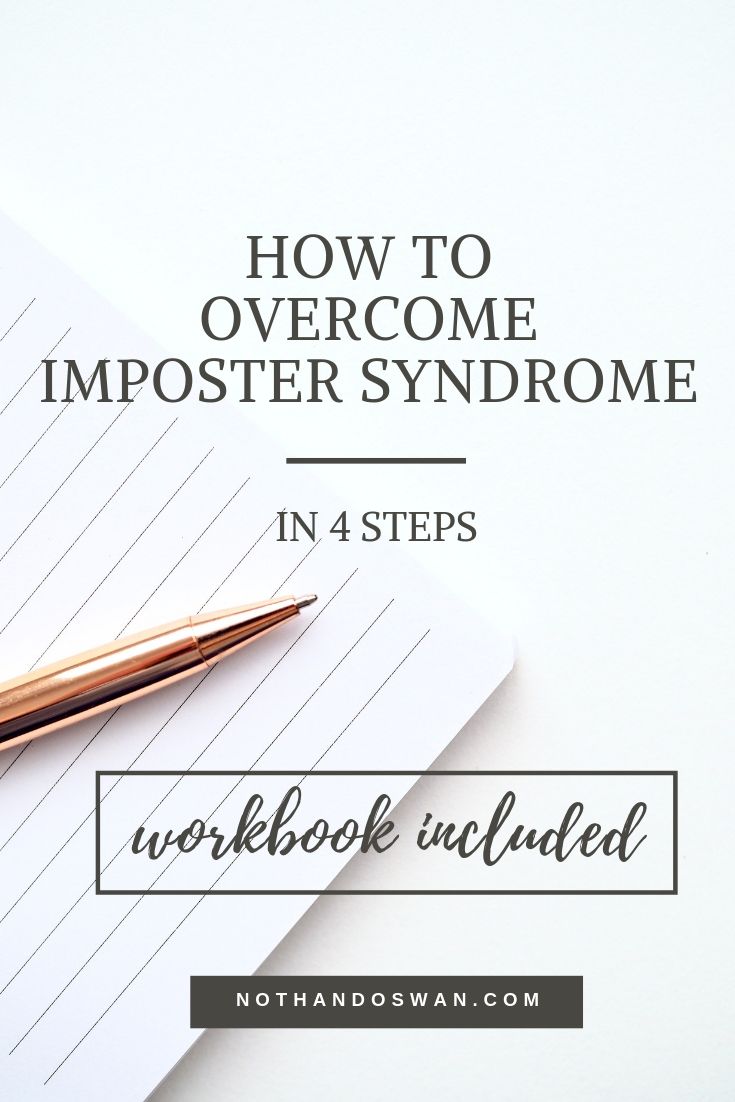
I’ve recently discovered that I have to get over myself. I speak Spanish.
But whenever I said that in the past, I felt like a fraud. Or I’d say that I spoke “just a little,” which isn’t true. I can hold a full conversation both casually and professionally.
What I’d really been struggling with was imposter syndrome. I wouldn’t admit that I spoke Spanish because I was afraid that if I did, someone who was more fluent than me would call me out.
Have you ever felt that way? Like you didn’t really deserve your title? Or like you were accidentally included in a group, and it was just a matter of time before you got kicked out?
If so, I’m going to walk you through four steps to overcome imposter syndrome. Feel free to download the workbook and fill in the exercises as we go. Got it? Okay, let’s get started!
Step 1: Write out what you’re thinking
First thing’s first: we gon’ have to call this thing by its name.
When you’re worried that you’re not worth your title, that’s imposter syndrome.
When you’ve finished that program, but still don’t feel qualified? Imposter syndrome.
And when you’ve worked on a passion for months but still don’t feel like it’s valid? You are dealing with imposter syndrome.
(This TedEd video does a great job of explaining this further).
Now, if you’re constantly feeling like a fraud, I’m willing to bet that you’re actually quite skilled. However, that’s not what you’re telling yourself. Take a moment to write down, in all honesty, the things that you’ve been thinking.
For me, it was:
- I don’t really speak Spanish
- I can sort of understand it
- I’m not fluent or anything, and
- Don’t be ridiculous. I’m not a real Spanish speaker.
I felt like I’d be lying if I said I spoke Spanish. However, there’s a huge difference between intentionally misrepresenting yourself and stating an uncomfortable truth.
Let’s just be honest here. If you were really a fraud, then you wouldn’t be worried about it. Instead, you’d be figuring out how to trick people into believing you had qualifications that you didn’t.
In step one, I want you to write down the exact fears and thoughts that you’ve been struggling with.
Step 2: Be real (examine the evidence)
Me telling myself that I didn’t speak Spanish was nonsense, okay? I minored in it, and I’d solo travelled to countries where I needed to use it. In fact, the best roommate I ever had – she was so sweet – told me that I kept speaking Spanish in my dreams during exam season!
In step two, I want you to be as fair as you can, and think of anything that contradicts what you’ve said in step one.
In my case, I realized I had to stop trippin’ after about the fifth patient who looked at me funny when I said, “I don’t really speak Spanish.”
I was working at a refugee health clinic where I served many Spanish-speaking patients.
The clinic was specifically designed to provide primary care to newcomers. Each room had access to a telephone interpreter who could translate visits in almost any language: French, Spanish, Amharic, Oromo, Hungarian, Tigrinya. Some of these were languages I’d never heard, and they were all beautiful.
So one day, I remember calling a patient from the waiting room, introducing myself in Spanish, and then continuing our conversation as I held for an interpreter. Yes, the weather was nice, and yes, I was new at the clinic.
When I told him we had to wait for an interpreter, he was really confused. I mean, we were already speaking, and I’d been on hold for a few minutes.
When she did come on the line, I had to interrupt the interpreter several times to tell her that, actually it was fine, I understood what he said, and she didn’t need to translate it.
At some point, I realized the visit was taking way more time than it needed to. We kept going back and forth. Me asking a question in English, her translating it into Spanish, him replying in Spanish, and me being like, okay yeah I understand that, but still having to wait for her to translate. This was proof. I really could understand and speak Spanish.
So for step two, I want you to list any and all examples that contradict what you’re telling yourself. For me, “I don’t really speak Spanish,” was countered with, “I spoke Spanish with patients every day this week.”
What evidence do you have that you might be able to do this big thing? If you’re worried about not qualifying for this promotion, did you feel that way when you got your job in the first place? Didn’t they hire you because of your credentials? Write it down.
Step 3: Decide what you’re going to do
Now I hate to break it to you, but there might be a tiny bit of merit in what you’re worrying about. But n-n-n-n-no. This is not me giving you permission to start back up with the negative self-talk.
What I’m saying is, these insecurities may be clues about where you can improve.
If you’re feeling like everyone knows more than you (which is a huge exaggeration – only some people do), then maybe it’s because you’ve identified knowledge gaps. You could read around them.
Or maybe you don’t feel like a “real” researcher because you haven’t decided on your research question. You could work on that.
I wasn’t confident with my Spanish for a number of reasons. Mainly, I didn’t know the words for certain things. And also, some verb tenses were difficult for me to use. With this in mind, my next action steps included building my medical vocabulary and reviewing the subjunctive verb tense.
You might be feeling like a fraud because instead of making progress towards your goals, you’re steady overanalyzing them. In step three, I want you to decide on a small, actionable step that will help you address your insecurities… and get started right away!
If you have more than one passion, then you know what it feels like to think you’re not a “real” one of something because there are other people who specialize in it. Please remember that experience counts. Passion counts. And a willingness to do the work and learn on the job most definitely counts.
You are not an imposter, and you do belong in the space that you’re occupying. Think of your insecurities as steps towards your end goal.
Step 4: Write the counter-narrative
Whew! I’m asking you to do a lot of work here, but this last step is the most important. Now that you’ve identified the thoughts that make you feel like an imposter, you can re-phrase them.
On one of my last days at the refugee health clinic, a woman who spoke Spanish needed urgent care. I won’t go into the details, but basically, instead of going to the emergency room, she came to us.
She knew that we could help her. She was counting on someone who could hear her story on her terms. So, I took her history in Spanish, assessed her in Spanish and decided that she needed to go to an emergency room.
She’d suspected this. It’s just that her language was a barrier to her access to care. She knew that if she came to us, we could explain her diagnosis and management in a way that she understood.
As we wrote a consult note and arranged for her to go to a nearby hospital, I couldn’t help but feel honoured that she trusted me. She kindly corrected the words I faltered on, but also told me she understood my instructions and what to expect at the hospital. She repeated the plan back to me, and she thanked me more times than she should have.
And when we called her the next day, she sounded perfectly fine as she updated us in Spanish.
And guess what? I understood that too. I understood her report of what happened in the emergency room, and so I finally acknowledged that my skills were real and valuable.
I rewrote the narrative that, “I wasn’t fluent or anything.” It became, “I speak Spanish, and I’m so glad I do, because there are so many patients who can benefit from that.”
If someone needs help and can’t explain his/her symptoms in English, I’m going to conduct that interview in Spanish. Because I can. And because it’s necessary.
Rewrite your narrative, remembering that even the most qualified people struggle with feelings of unworthiness. The key is to identify this thought process and keep doing your work anyways.
What you do is so important. It’s normal to doubt yourself at times, but don’t get stuck in that space. Being able to move through psychologic phenomena like imposter syndrome is an important part of our self-care. (Read: How to Work Past Self-Doubt When You Have Big Goals)
Summary
Unfortunately, imposter syndrome is common, especially in high-achieving, highly qualified women. In other words, you are not alone.
In fact, Clance and Imes wrote about this phenomenon in their seminal paper in the ’70s when they studied imposter syndrome in more than 100 highly educated women.
Nothing shakes your confidence like earning a degree, starting a business, or nurturing a family!
Interestingly, in their article, Clance and Imes note that group work with other high-achieving women helped combat feelings of imposter syndrome. So, now that we’ve talked about me and my imposter syndrome, I hope you’ll work through yours. Don’t forget to download the workbook that will recap these steps and give you space to reflect on your own work.
Once again, those steps are:
- Write out what you’re thinking
- Be real (examine the evidence)
- Decide what you’re going to do about it, and
- Write the counter-narrative
I really want you to work through these four steps because the truth is, you have important work to do. Your passion is meaningful, and if you’re going to do it, you’re going to have to work past imposter syndrome. (Read: 4 Reasons to Make Time For Your Passion Now)
And last thing: if you enjoy reading about different personality types, then this post is for you. It walks you through the different ways that imposter syndrome can show up based on ways of thinking. It’ll also help you answer step 1 in the workbook. You’ve got this.
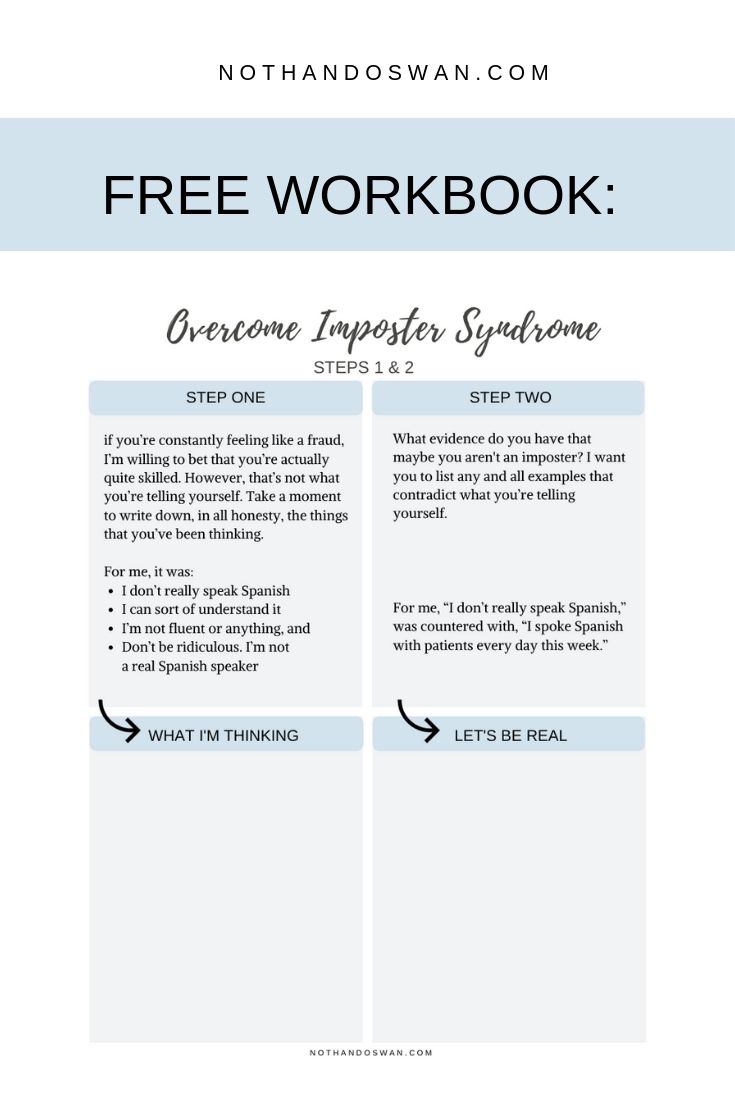
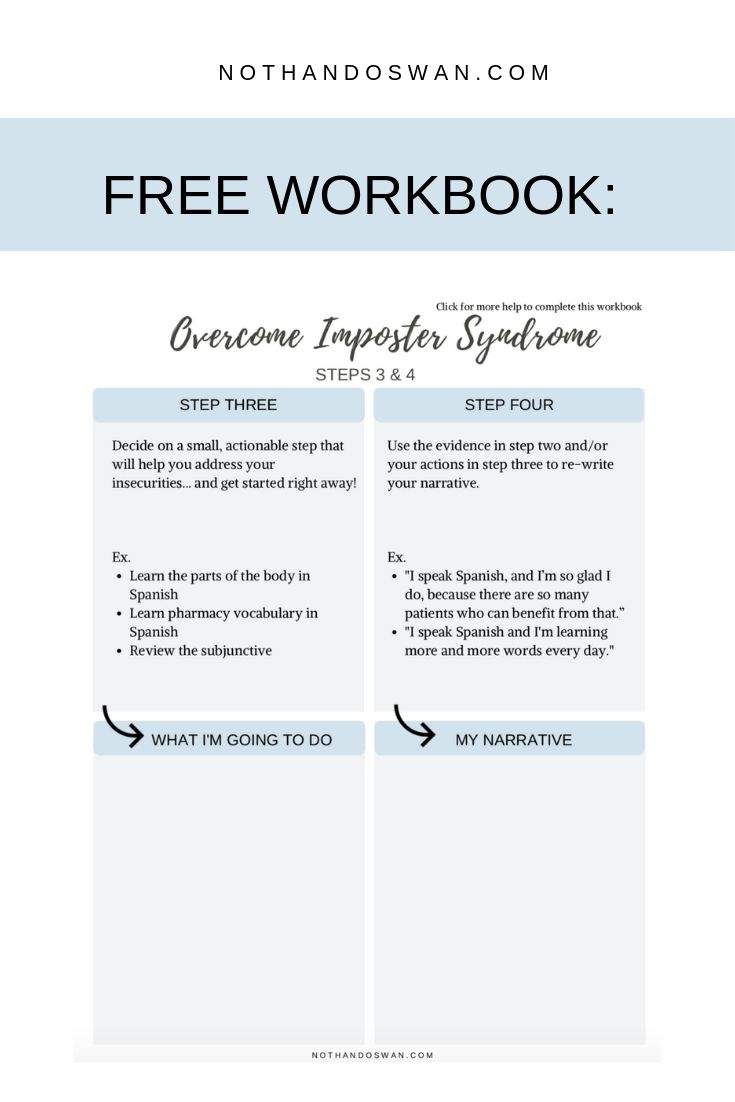
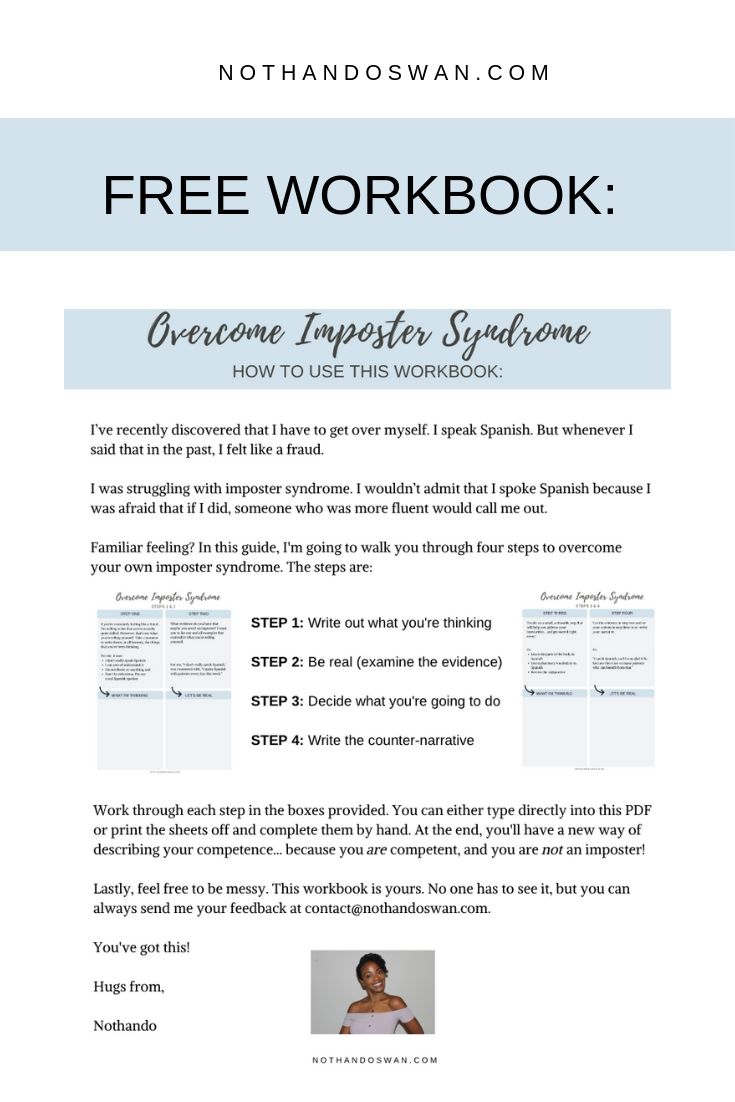
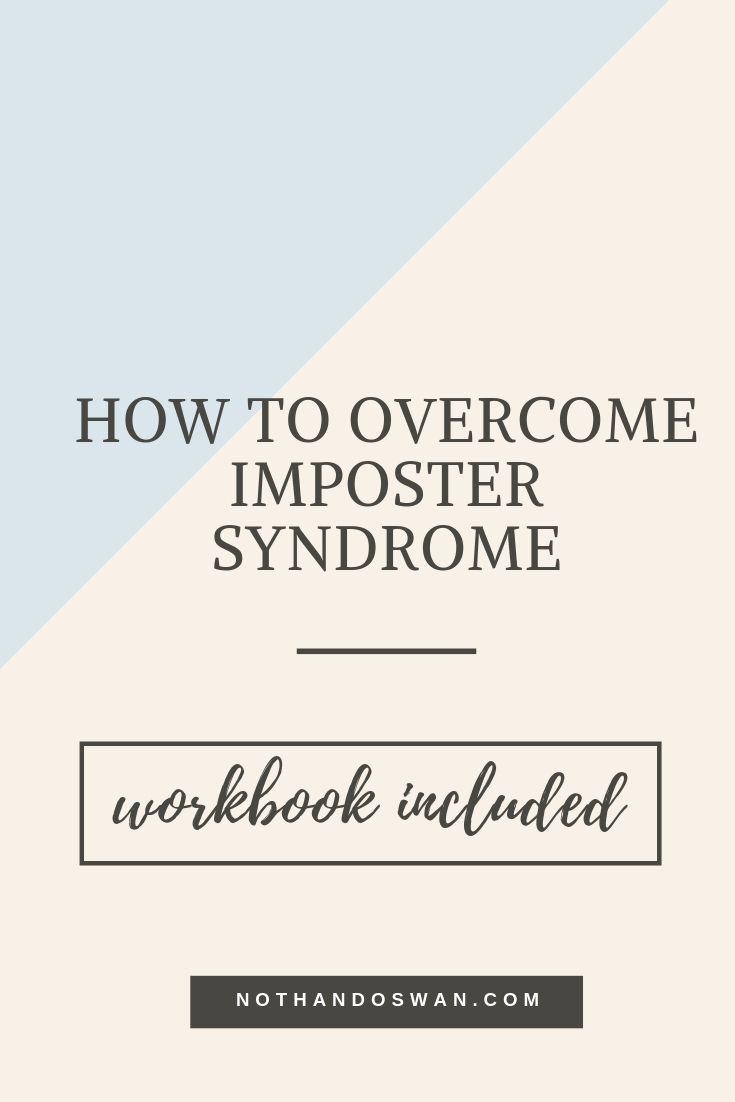
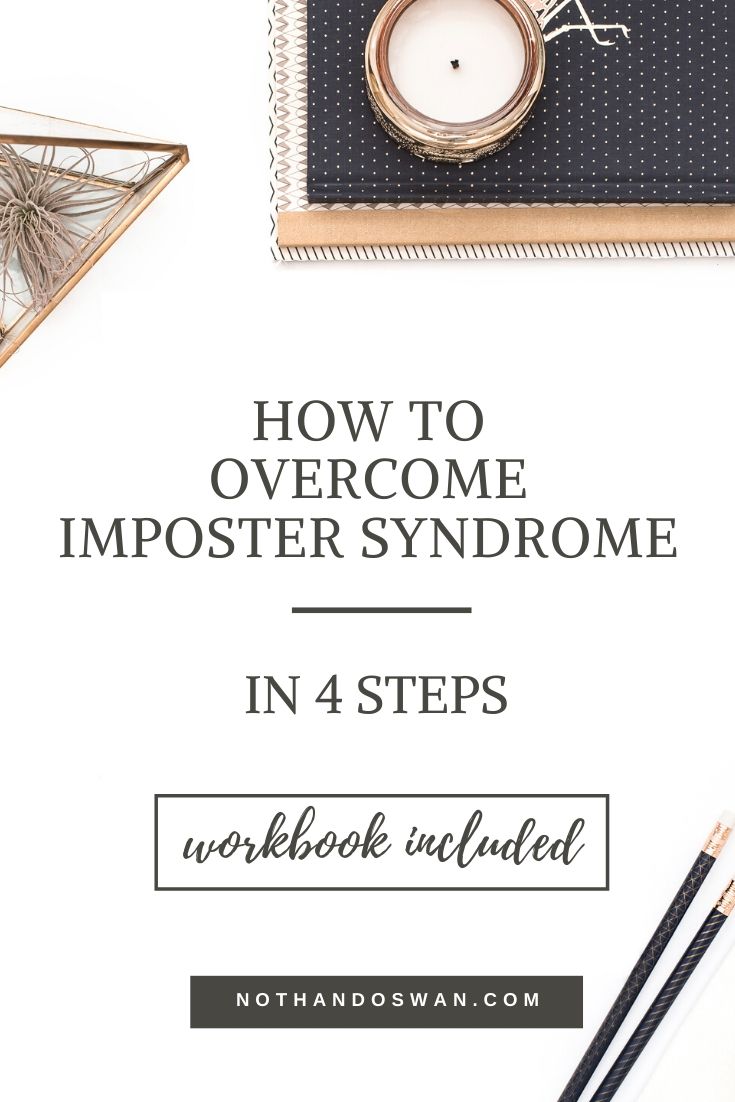
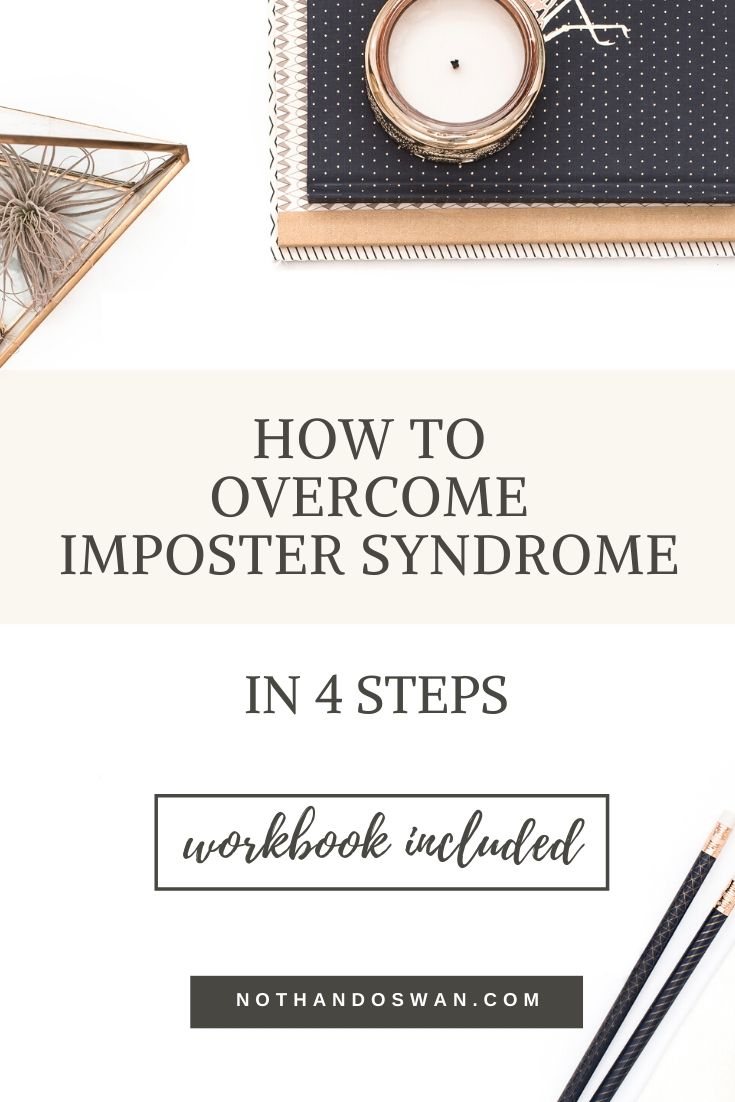
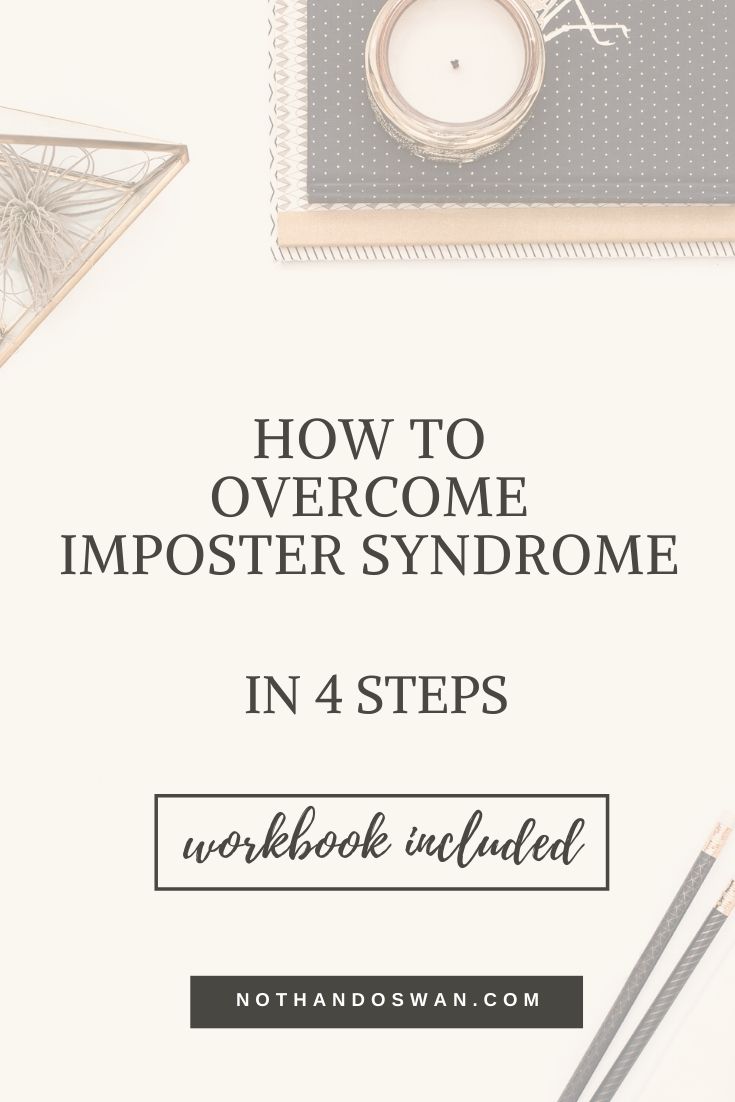
It’s reassuring to know that I’m not the only one who feels the impostor syndrome at times! I really like that the first step to fully acknowledge it for what it is and then to look at your counter-narratives. Great post 🙂
Author
Thanks Stacy! That first step is so important.